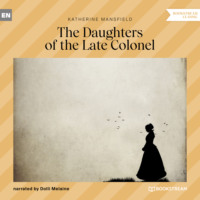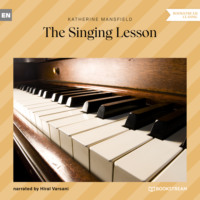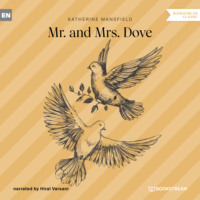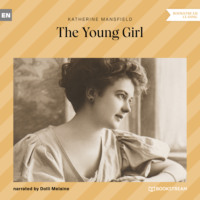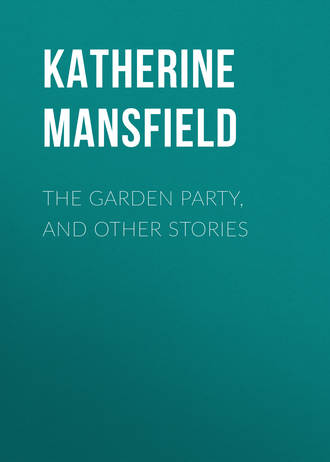 полная версия
полная версияThe Garden Party, and Other Stories
“Come along, little lady,” said the fat man. He scarcely troubled to clasp her, and they moved away so gently, it was more like walking than dancing. But he said not a word about the floor. “Your first dance, isn’t it?” he murmured.
“How did you know?”
“Ah,” said the fat man, “that’s what it is to be old!” He wheezed faintly as he steered her past an awkward couple. “You see, I’ve been doing this kind of thing for the last thirty years.”
“Thirty years?” cried Leila. Twelve years before she was born!
“It hardly bears thinking about, does it?” said the fat man gloomily. Leila looked at his bald head, and she felt quite sorry for him.
“I think it’s marvellous to be still going on,” she said kindly.
“Kind little lady,” said the fat man, and he pressed her a little closer, and hummed a bar of the waltz. “Of course,” he said, “you can’t hope to last anything like as long as that. No-o,” said the fat man, “long before that you’ll be sitting up there on the stage, looking on, in your nice black velvet. And these pretty arms will have turned into little short fat ones, and you’ll beat time with such a different kind of fan—a black bony one.” The fat man seemed to shudder. “And you’ll smile away like the poor old dears up there, and point to your daughter, and tell the elderly lady next to you how some dreadful man tried to kiss her at the club ball. And your heart will ache, ache”—the fat man squeezed her closer still, as if he really was sorry for that poor heart—“because no one wants to kiss you now. And you’ll say how unpleasant these polished floors are to walk on, how dangerous they are. Eh, Mademoiselle Twinkletoes?” said the fat man softly.
Leila gave a light little laugh, but she did not feel like laughing. Was it—could it all be true? It sounded terribly true. Was this first ball only the beginning of her last ball, after all? At that the music seemed to change; it sounded sad, sad; it rose upon a great sigh. Oh, how quickly things changed! Why didn’t happiness last for ever? For ever wasn’t a bit too long.
“I want to stop,” she said in a breathless voice. The fat man led her to the door.
“No,” she said, “I won’t go outside. I won’t sit down. I’ll just stand here, thank you.” She leaned against the wall, tapping with her foot, pulling up her gloves and trying to smile. But deep inside her a little girl threw her pinafore over her head and sobbed. Why had he spoiled it all?
“I say, you know,” said the fat man, “you mustn’t take me seriously, little lady.”
“As if I should!” said Leila, tossing her small dark head and sucking her underlip…
Again the couples paraded. The swing doors opened and shut. Now new music was given out by the bandmaster. But Leila didn’t want to dance any more. She wanted to be home, or sitting on the veranda listening to those baby owls. When she looked through the dark windows at the stars, they had long beams like wings…
But presently a soft, melting, ravishing tune began, and a young man with curly hair bowed before her. She would have to dance, out of politeness, until she could find Meg. Very stiffly she walked into the middle; very haughtily she put her hand on his sleeve. But in one minute, in one turn, her feet glided, glided. The lights, the azaleas, the dresses, the pink faces, the velvet chairs, all became one beautiful flying wheel. And when her next partner bumped her into the fat man and he said, “Pardon,” she smiled at him more radiantly than ever. She didn’t even recognise him again.
11. THE SINGING LESSON
With despair—cold, sharp despair—buried deep in her heart like a wicked knife, Miss Meadows, in cap and gown and carrying a little baton, trod the cold corridors that led to the music hall. Girls of all ages, rosy from the air, and bubbling over with that gleeful excitement that comes from running to school on a fine autumn morning, hurried, skipped, fluttered by; from the hollow class-rooms came a quick drumming of voices; a bell rang; a voice like a bird cried, “Muriel.” And then there came from the staircase a tremendous knock-knock-knocking. Some one had dropped her dumbbells.
The Science Mistress stopped Miss Meadows.
“Good mor-ning,” she cried, in her sweet, affected drawl. “Isn’t it cold? It might be win-ter.”
Miss Meadows, hugging the knife, stared in hatred at the Science Mistress. Everything about her was sweet, pale, like honey. You wold not have been surprised to see a bee caught in the tangles of that yellow hair.
“It is rather sharp,” said Miss Meadows, grimly.
The other smiled her sugary smile.
“You look fro-zen,” said she. Her blue eyes opened wide; there came a mocking light in them. (Had she noticed anything?)
“Oh, not quite as bad as that,” said Miss Meadows, and she gave the Science Mistress, in exchange for her smile, a quick grimace and passed on…
Forms Four, Five, and Six were assembled in the music hall. The noise was deafening. On the platform, by the piano, stood Mary Beazley, Miss Meadows’ favourite, who played accompaniments. She was turning the music stool. When she saw Miss Meadows she gave a loud, warning “Sh-sh! girls!” and Miss Meadows, her hands thrust in her sleeves, the baton under her arm, strode down the centre aisle, mounted the steps, turned sharply, seized the brass music stand, planted it in front of her, and gave two sharp taps with her baton for silence.
“Silence, please! Immediately!” and, looking at nobody, her glance swept over that sea of coloured flannel blouses, with bobbing pink faces and hands, quivering butterfly hair-bows, and music-books outspread. She knew perfectly well what they were thinking. “Meady is in a wax.” Well, let them think it! Her eyelids quivered; she tossed her head, defying them. What could the thoughts of those creatures matter to some one who stood there bleeding to death, pierced to the heart, to the heart, by such a letter—
… “I feel more and more strongly that our marriage would be a mistake. Not that I do not love you. I love you as much as it is possible for me to love any woman, but, truth to tell, I have come to the conclusion that I am not a marrying man, and the idea of settling down fills me with nothing but—” and the word “disgust” was scratched out lightly and “regret” written over the top.
Basil! Miss Meadows stalked over to the piano. And Mary Beazley, who was waiting for this moment, bent forward; her curls fell over her cheeks while she breathed, “Good morning, Miss Meadows,” and she motioned towards rather than handed to her mistress a beautiful yellow chrysanthemum. This little ritual of the flower had been gone through for ages and ages, quite a term and a half. It was as much part of the lesson as opening the piano. But this morning, instead of taking it up, instead of tucking it into her belt while she leant over Mary and said, “Thank you, Mary. How very nice! Turn to page thirty-two,” what was Mary’s horror when Miss Meadows totally ignored the chrysanthemum, made no reply to her greeting, but said in a voice of ice, “Page fourteen, please, and mark the accents well.”
Staggering moment! Mary blushed until the tears stood in her eyes, but Miss Meadows was gone back to the music stand; her voice rang through the music hall.
“Page fourteen. We will begin with page fourteen. ‘A Lament.’ Now, girls, you ought to know it by this time. We shall take it all together; not in parts, all together. And without expression. Sing it, though, quite simply, beating time with the left hand.”
She raised the baton; she tapped the music stand twice. Down came Mary on the opening chord; down came all those left hands, beating the air, and in chimed those young, mournful voices:—
“Fast! Ah, too Fast Fade the Ro-o-ses of Pleasure; Soon Autumn yields unto Wi-i-nter Drear. Fleetly! Ah, Fleetly Mu-u-sic’s Gay Measure Passes away from the Listening Ear.”Good Heavens, what could be more tragic than that lament! Every note was a sigh, a sob, a groan of awful mournfulness. Miss Meadows lifted her arms in the wide gown and began conducting with both hands. “… I feel more and more strongly that our marriage would be a mistake… “ she beat. And the voices cried: “Fleetly! Ah, Fleetly.” What could have possessed him to write such a letter! What could have led up to it! It came out of nothing. His last letter had been all about a fumed-oak bookcase he had bought for “our” books, and a “natty little hall-stand” he had seen, “a very neat affair with a carved owl on a bracket, holding three hat-brushes in its claws.” How she had smiled at that! So like a man to think one needed three hat-brushes! “From the Listening Ear,” sang the voices.
“Once again,” said Miss Meadows. “But this time in parts. Still without expression.” “Fast! Ah, too Fast.” With the gloom of the contraltos added, one could scarcely help shuddering. “Fade the Roses of Pleasure.” Last time he had come to see her, Basil had worn a rose in his buttonhole. How handsome he had looked in that bright blue suit, with that dark red rose! And he knew it, too. He couldn’t help knowing it. First he stroked his hair, then his moustache; his teeth gleamed when he smiled.
“The headmaster’s wife keeps on asking me to dinner. It’s a perfect nuisance. I never get an evening to myself in that place.”
“But can’t you refuse?”
“Oh, well, it doesn’t do for a man in my position to be unpopular.”
“Music’s Gay Measure,” wailed the voices. The willow trees, outside the high, narrow windows, waved in the wind. They had lost half their leaves. The tiny ones that clung wriggled like fishes caught on a line. “… I am not a marrying man… “ The voices were silent; the piano waited.
“Quite good,” said Miss Meadows, but still in such a strange, stony tone that the younger girls began to feel positively frightened. “But now that we know it, we shall take it with expression. As much expression as you can put into it. Think of the words, girls. Use your imaginations. ‘Fast! Ah, too Fast,’” cried Miss Meadows. “That ought to break out—a loud, strong forte—a lament. And then in the second line, ‘Winter Drear,’ make that ‘Drear’ sound as if a cold wind were blowing through it. ‘Dre-ear!’” said she so awfully that Mary Beazley, on the music stool, wriggled her spine. “The third line should be one crescendo. ‘Fleetly! Ah, Fleetly Music’s Gay Measure.’ Breaking on the first word of the last line, Passes.’ And then on the word, ‘Away,’ you must begin to die… to fade… until ‘The Listening Ear’ is nothing more than a faint whisper… You can slow down as much as you like almost on the last line. Now, please.”
Again the two light taps; she lifted her arms again. ‘Fast! Ah, too Fast.’ “… and the idea of settling down fills me with nothing but disgust—” Disgust was what he had written. That was as good as to say their engagement was definitely broken off. Broken off! Their engagement! People had been surprised enough that she had got engaged. The Science Mistress would not believe it at first. But nobody had been as surprised as she. She was thirty. Basil was twenty-five. It had been a miracle, simply a miracle, to hear him say, as they walked home from church that very dark night, “You know, somehow or other, I’ve got fond of you.” And he had taken hold of the end of her ostrich feather boa. “Passes away from the Listening Ear.”
“Repeat! Repeat!” said Miss Meadows. “More expression, girls! Once more!”
“Fast! Ah, too Fast.” The older girls were crimson; some of the younger ones began to cry. Big spots of rain blew against the windows, and one could hear the willows whispering, “… not that I do not love you… ”
“But, my darling, if you love me,” thought Miss Meadows, “I don’t mind how much it is. Love me as little as you like.” But she knew he didn’t love her. Not to have cared enough to scratch out that word “disgust,” so that she couldn’t read it! “Soon Autumn yields unto Winter Drear.” She would have to leave the school, too. She could never face the Science Mistress or the girls after it got known. She would have to disappear somewhere. “Passes away.” The voices began to die, to fade, to whisper… to vanish…
Suddenly the door opened. A little girl in blue walked fussily up the aisle, hanging her head, biting her lips, and twisting the silver bangle on her red little wrist. She came up the steps and stood before Miss Meadows.
“Well, Monica, what is it?”
“Oh, if you please, Miss Meadows,” said the little girl, gasping, “Miss Wyatt wants to see you in the mistress’s room.”
“Very well,” said Miss Meadows. And she called to the girls, “I shall put you on your honour to talk quietly while I am away.” But they were too subdued to do anything else. Most of them were blowing their noses.
The corridors were silent and cold; they echoed to Miss Meadows’ steps. The head mistress sat at her desk. For a moment she did not look up. She was as usual disentangling her eyeglasses, which had got caught in her lace tie. “Sit down, Miss Meadows,” she said very kindly. And then she picked up a pink envelope from the blotting-pad. “I sent for you just now because this telegram has come for you.”
“A telegram for me, Miss Wyatt?”
Basil! He had committed suicide, decided Miss Meadows. Her hand flew out, but Miss Wyatt held the telegram back a moment. “I hope it’s not bad news,” she said, so more than kindly. And Miss Meadows tore it open.
“Pay no attention to letter, must have been mad, bought hat-stand to-day—Basil,” she read. She couldn’t take her eyes off the telegram.
“I do hope it’s nothing very serious,” said Miss Wyatt, leaning forward.
“Oh, no, thank you, Miss Wyatt,” blushed Miss Meadows. “It’s nothing bad at all. It’s”—and she gave an apologetic little laugh—“it’s from my fiance saying that… saying that—” There was a pause. “I see,” said Miss Wyatt. And another pause. Then—“You’ve fifteen minutes more of your class, Miss Meadows, haven’t you?”
“Yes, Miss Wyatt.” She got up. She half ran towards the door.
“Oh, just one minute, Miss Meadows,” said Miss Wyatt. “I must say I don’t approve of my teachers having telegrams sent to them in school hours, unless in case of very bad news, such as death,” explained Miss Wyatt, “or a very serious accident, or something to that effect. Good news, Miss Meadows, will always keep, you know.”
On the wings of hope, of love, of joy, Miss Meadows sped back to the music hall, up the aisle, up the steps, over to the piano.
“Page thirty-two, Mary,” she said, “page thirty-two,” and, picking up the yellow chrysanthemum, she held it to her lips to hide her smile. Then she turned to the girls, rapped with her baton: “Page thirty-two, girls. Page thirty-two.”
“We come here To-day with Flowers o’erladen, With Baskets of Fruit and Ribbons to boot, To-oo Congratulate…“Stop! Stop!” cried Miss Meadows. “This is awful. This is dreadful.” And she beamed at her girls. “What’s the matter with you all? Think, girls, think of what you’re singing. Use your imaginations. ‘With Flowers o’erladen. Baskets of Fruit and Ribbons to boot.’ And ‘Congratulate.’” Miss Meadows broke off. “Don’t look so doleful, girls. It ought to sound warm, joyful, eager. ‘Congratulate.’ Once more. Quickly. All together. Now then!”
And this time Miss Meadows’ voice sounded over all the other voices—full, deep, glowing with expression.
12. THE STRANGER
It seemed to the little crowd on the wharf that she was never going to move again. There she lay, immense, motionless on the grey crinkled water, a loop of smoke above her, an immense flock of gulls screaming and diving after the galley droppings at the stern. You could just see little couples parading—little flies walking up and down the dish on the grey crinkled tablecloth. Other flies clustered and swarmed at the edge. Now there was a gleam of white on the lower deck—the cook’s apron or the stewardess perhaps. Now a tiny black spider raced up the ladder on to the bridge.
In the front of the crowd a strong-looking, middle-aged man, dressed very well, very snugly in a grey overcoat, grey silk scarf, thick gloves and dark felt hat, marched up and down, twirling his folded umbrella. He seemed to be the leader of the little crowd on the wharf and at the same time to keep them together. He was something between the sheep-dog and the shepherd.
But what a fool—what a fool he had been not to bring any glasses! There wasn’t a pair of glasses between the whole lot of them.
“Curious thing, Mr. Scott, that none of us thought of glasses. We might have been able to stir ‘em up a bit. We might have managed a little signalling. ‘Don’t hesitate to land. Natives harmless.’ Or: ‘A welcome awaits you. All is forgiven.’ What? Eh?”
Mr. Hammond’s quick, eager glance, so nervous and yet so friendly and confiding, took in everybody on the wharf, roped in even those old chaps lounging against the gangways. They knew, every man-jack of them, that Mrs. Hammond was on that boat, and that he was so tremendously excited it never entered his head not to believe that this marvellous fact meant something to them too. It warmed his heart towards them. They were, he decided, as decent a crowd of people—Those old chaps over by the gangways, too—fine, solid old chaps. What chests—by Jove! And he squared his own, plunged his thick-gloved hands into his pockets, rocked from heel to toe.
“Yes, my wife’s been in Europe for the last ten months. On a visit to our eldest girl, who was married last year. I brought her up here, as far as Salisbury, myself. So I thought I’d better come and fetch her back. Yes, yes, yes.” The shrewd grey eyes narrowed again and searched anxiously, quickly, the motionless liner. Again his overcoat was unbuttoned. Out came the thin, butter-yellow watch again, and for the twentieth—fiftieth—hundredth time he made the calculation.
“Let me see now. It was two fifteen when the doctor’s launch went off. Two fifteen. It is now exactly twenty-eight minutes past four. That is to say, the doctor’s been gone two hours and thirteen minutes. Two hours and thirteen minutes! Whee-ooh!” He gave a queer little half-whistle and snapped his watch to again. “But I think we should have been told if there was anything up—don’t you, Mr. Gaven?”
“Oh, yes, Mr. Hammond! I don’t think there’s anything to—anything to worry about,” said Mr. Gaven, knocking out his pipe against the heel of his shoe. “At the same time—”
“Quite so! Quite so!” cried Mr. Hammond. “Dashed annoying!” He paced quickly up and down and came back again to his stand between Mr. and Mrs. Scott and Mr. Gaven. “It’s getting quite dark, too,” and he waved his folded umbrella as though the dusk at least might have had the decency to keep off for a bit. But the dusk came slowly, spreading like a slow stain over the water. Little Jean Scott dragged at her mother’s hand.
“I wan’ my tea, mammy!” she wailed.
“I expect you do,” said Mr. Hammond. “I expect all these ladies want their tea.” And his kind, flushed, almost pitiful glance roped them all in again. He wondered whether Janey was having a final cup of tea in the saloon out there. He hoped so; he thought not. It would be just like her not to leave the deck. In that case perhaps the deck steward would bring her up a cup. If he’d been there he’d have got it for her—somehow. And for a moment he was on deck, standing over her, watching her little hand fold round the cup in the way she had, while she drank the only cup of tea to be got on board… But now he was back here, and the Lord only knew when that cursed Captain would stop hanging about in the stream. He took another turn, up and down, up and down. He walked as far as the cab-stand to make sure his driver hadn’t disappeared; back he swerved again to the little flock huddled in the shelter of the banana crates. Little Jean Scott was still wanting her tea. Poor little beggar! He wished he had a bit of chocolate on him.
“Here, Jean!” he said. “Like a lift up?” And easily, gently, he swung the little girl on to a higher barrel. The movement of holding her, steadying her, relieved him wonderfully, lightened his heart.
“Hold on,” he said, keeping an arm round her.
“Oh, don’t worry about Jean, Mr. Hammond!” said Mrs. Scott.
“That’s all right, Mrs. Scott. No trouble. It’s a pleasure. Jean’s a little pal of mine, aren’t you, Jean?”
“Yes, Mr. Hammond,” said Jean, and she ran her finger down the dent of his felt hat.
But suddenly she caught him by the ear and gave a loud scream. “Lo-ok, Mr. Hammond! She’s moving! Look, she’s coming in!”
By Jove! So she was. At last! She was slowly, slowly turning round. A bell sounded far over the water and a great spout of steam gushed into the air. The gulls rose; they fluttered away like bits of white paper. And whether that deep throbbing was her engines or his heart Mr. Hammond couldn’t say. He had to nerve himself to bear it, whatever it was. At that moment old Captain Johnson, the harbour-master, came striding down the wharf, a leather portfolio under his arm.
“Jean’ll be all right,” said Mr. Scott. “I’ll hold her.” He was just in time. Mr. Hammond had forgotten about Jean. He sprang away to greet old Captain Johnson.
“Well, Captain,” the eager, nervous voice rang out again, “you’ve taken pity on us at last.”
“It’s no good blaming me, Mr. Hammond,” wheezed old Captain Johnson, staring at the liner. “You got Mrs. Hammond on board, ain’t yer?”
“Yes, yes!” said Hammond, and he kept by the harbour-master’s side. “Mrs. Hammond’s there. Hul-lo! We shan’t be long now!”
With her telephone ring-ringing, the thrum of her screw filling the air, the big liner bore down on them, cutting sharp through the dark water so that big white shavings curled to either side. Hammond and the harbour-master kept in front of the rest. Hammond took off his hat; he raked the decks—they were crammed with passengers; he waved his hat and bawled a loud, strange “Hul-lo!” across the water; and then turned round and burst out laughing and said something—nothing—to old Captain Johnson.
“Seen her?” asked the harbour-master.
“No, not yet. Steady—wait a bit!” And suddenly, between two great clumsy idiots—“Get out of the way there!” he signed with his umbrella—he saw a hand raised—a white glove shaking a handkerchief. Another moment, and—thank God, thank God!—there she was. There was Janey. There was Mrs. Hammond, yes, yes, yes—standing by the rail and smiling and nodding and waving her handkerchief.
“Well that’s first class—first class! Well, well, well!” He positively stamped. Like lightning he drew out his cigar-case and offered it to old Captain Johnson. “Have a cigar, Captain! They’re pretty good. Have a couple! Here”—and he pressed all the cigars in the case on the harbour-master—“I’ve a couple of boxes up at the hotel.”
“Thenks, Mr. Hammond!” wheezed old Captain Johnson.
Hammond stuffed the cigar-case back. His hands were shaking, but he’d got hold of himself again. He was able to face Janey. There she was, leaning on the rail, talking to some woman and at the same time watching him, ready for him. It struck him, as the gulf of water closed, how small she looked on that huge ship. His heart was wrung with such a spasm that he could have cried out. How little she looked to have come all that long way and back by herself! Just like her, though. Just like Janey. She had the courage of a—And now the crew had come forward and parted the passengers; they had lowered the rails for the gangways.
The voices on shore and the voices on board flew to greet each other.
“All well?”
“All well.”
“How’s mother?”
“Much better.”
“Hullo, Jean!”
“Hillo, Aun’ Emily!”
“Had a good voyage?”
“Splendid!”
“Shan’t be long now!”
“Not long now.”
The engines stopped. Slowly she edged to the wharf-side.
“Make way there—make way—make way!” And the wharf hands brought the heavy gangways along at a sweeping run. Hammond signed to Janey to stay where she was. The old harbour-master stepped forward; he followed. As to “ladies first,” or any rot like that, it never entered his head.
“After you, Captain!” he cried genially. And, treading on the old man’s heels, he strode up the gangway on to the deck in a bee-line to Janey, and Janey was clasped in his arms.
“Well, well, well! Yes, yes! Here we are at last!” he stammered. It was all he could say. And Janey emerged, and her cool little voice—the only voice in the world for him—said,
“Well, darling! Have you been waiting long?”
No; not long. Or, at any rate, it didn’t matter. It was over now. But the point was, he had a cab waiting at the end of the wharf. Was she ready to go off. Was her luggage ready? In that case they could cut off sharp with her cabin luggage and let the rest go hang until to-morrow. He bent over her and she looked up with her familiar half-smile. She was just the same. Not a day changed. Just as he’d always known her. She laid her small hand on his sleeve.


